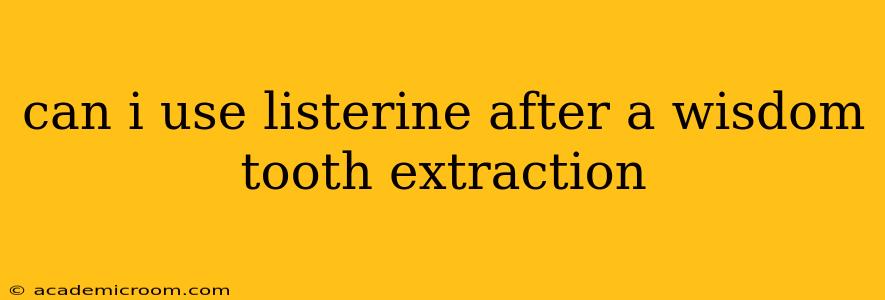Can I Use Listerine After a Wisdom Tooth Extraction?
The short answer is: probably not, at least not right away. While Listerine is a powerful mouthwash known for its antiseptic properties, using it after a wisdom tooth extraction can be detrimental to your healing process. The strong alcohol content and harsh ingredients can irritate the sensitive extraction site, potentially delaying healing and increasing the risk of complications.
This article will delve into the reasons why you should exercise caution, and what alternatives you should consider for maintaining good oral hygiene post-extraction.
What are the risks of using Listerine after a wisdom tooth extraction?
The primary concern with using Listerine after a wisdom tooth extraction is the alcohol content. Alcohol can dry out the extraction socket, hindering the formation of the blood clot crucial for healing. A dislodged blood clot can lead to a painful and potentially serious complication called dry socket. Dry socket is characterized by intense pain, bad breath, and a visible empty socket.
Beyond alcohol, Listerine contains various other ingredients that could irritate the sensitive tissues surrounding the extraction site. This irritation can cause discomfort, inflammation, and potentially prolong the healing time.
What mouthwash should I use after a wisdom tooth extraction?
Your dentist or oral surgeon will likely recommend a gentle, alcohol-free mouthwash. These mouthwashes are specifically formulated to clean the mouth without causing irritation or interfering with the healing process. Always follow their instructions regarding the frequency and method of use. Some dentists might even recommend using saltwater rinses instead of commercial mouthwashes.
A simple saltwater rinse is often the best option in the immediate post-operative period. It's easy to make and provides effective cleaning without the potential for irritation.
When can I start using Listerine again after a wisdom tooth extraction?
It's best to avoid using Listerine until your dentist or oral surgeon gives you the all-clear. This is typically after the extraction site has completely healed, which usually takes several weeks. Once the healing is complete, you can gradually reintroduce Listerine into your oral hygiene routine. However, consider using it sparingly or diluting it with water to minimize any potential irritation.
What are the best practices for oral hygiene after a wisdom tooth extraction?
Maintaining good oral hygiene after a wisdom tooth extraction is crucial for preventing infection and promoting healing. Here are some key practices:
- Gentle brushing: Avoid brushing directly over the extraction site for the first few days.
- Saltwater rinses: These are highly effective for cleaning the area gently and preventing infection.
- Avoid straws and smoking: These can dislodge the blood clot.
- Follow your dentist's instructions: This is paramount for optimal healing.
Remember, your dentist's advice is specific to your case. Always adhere to their post-operative instructions to ensure proper healing and prevent complications.
How long does it take for a wisdom tooth extraction site to heal completely?
The healing time for a wisdom tooth extraction varies depending on the complexity of the procedure and individual healing rates. However, it generally takes several weeks for the extraction site to completely heal. You'll likely notice significant improvement within the first week, but complete healing can take longer.
Can I use other mouthwashes besides Listerine after wisdom tooth extraction?
As mentioned, you should use only alcohol-free mouthwashes recommended by your dentist. Many brands offer alcohol-free options specifically designed for sensitive gums and post-operative care. Always check the label to ensure it's alcohol-free and suitable for your situation. Your dentist will be able to guide you to an appropriate choice.
By following these guidelines, you can ensure a smooth recovery and maintain optimal oral hygiene after your wisdom tooth extraction. Remember, prioritizing your oral health is essential for overall well-being. Always consult your dentist for personalized advice and guidance.
